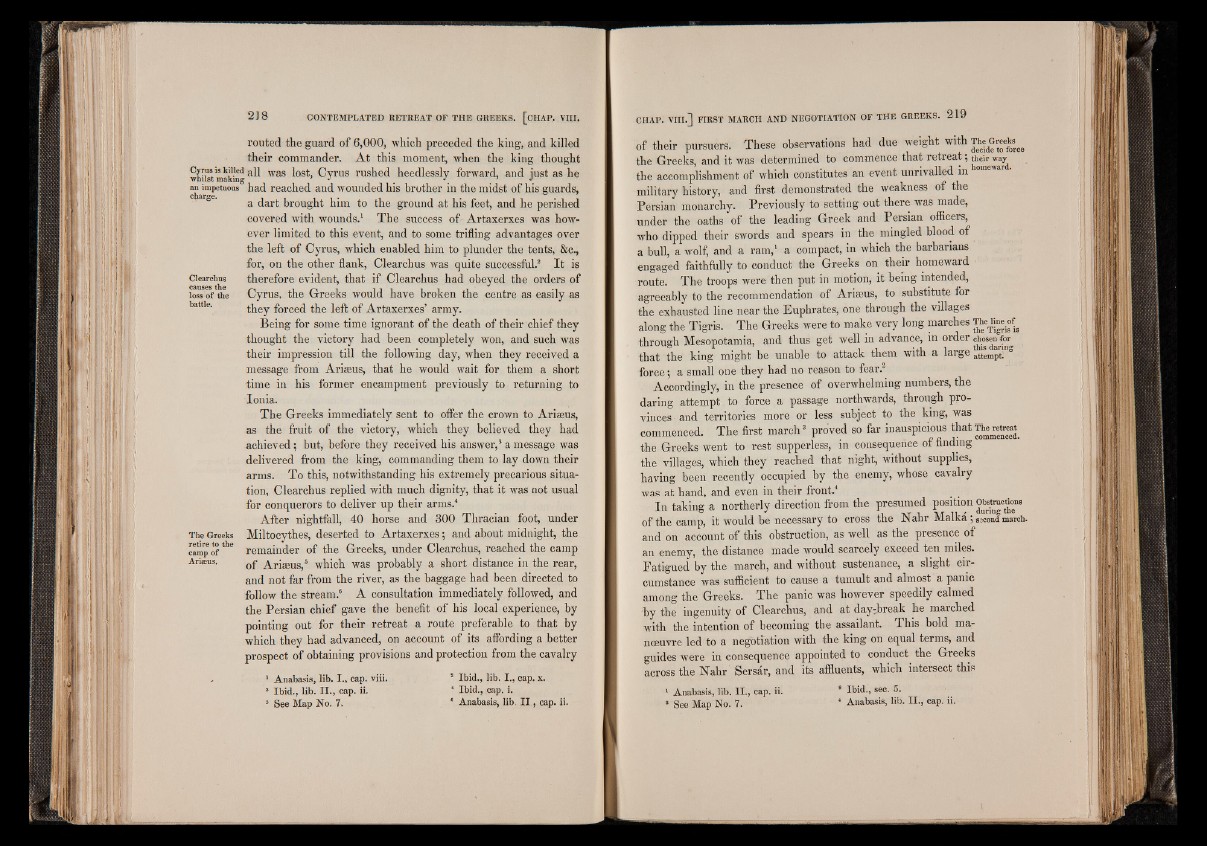
routed the guard of 6,000, which preceded the king, and killed
their commander. At this moment, when the king thought
whiTst makind ^ was lost, Cyrus rushed heedlessly forward, and just as he
an impetuous had reached and wounded his brother in the midst of his guards,
charge. a dart brought him to the ground at his feet, and he perished
covered with wounds.1 The success of Artaxerxes was however
limited to this event, and to some trifling advantages over
the left of Cyrus, which enabled him to plunder the tents, &c.,
for, on the other flank, Clearchus was quite successful.2 It is
ciearchus therefore evident, that if Clearchus had obeyed the orders of
loss of the Cyrus, the Greeks would have broken the centre as easily as
att e' they forced the left of Artaxerxes’ army.
Being for some time ignorant of the death of their chief they
thought the victory had been completely won, and such was
their impression till the following day, when they received a
message from Ariaeus, that he would wait for them a short
time in his former encampment previously to returning to
Ionia.
The Greeks immediately sent to offer the crown to Ariaeus,
as the fruit of the victory, which they believed they had
achieved; but, before they received his answer,3 a message was
delivered from the king, commanding them to lay down their
arms. To this, notwithstanding his extremely precarious situation,
Clearchus replied with much dignity, that it was not usual
for conquerors to deliver up their arms.4
After nightfall, 40 horse and 300 Thracian foot, under
The Greeks Miltocythes, deserted to Artaxerxes; and about midnight, the
camp o f 4116 remainder of the Greeks, under Clearchus, reached the camp
Arraus. 0f Ariaeus,6 which was probably a short distance in the rear,
and not far from the river, as the baggage had been directed to
follow the stream.6 A consultation immediately followed, and
the Persian chief gave the benefit of his local experience, by
pointing out for their retreat a route preferable to that by
which they had advanced, on account of its affording a better
prospect of obtaining provisions and protection from the cavalry
* Anabasis, lib. I., cap. viii.
3 Ibid., lib. I I ., cap. ii.
5 See Map No. 7.
2 Ibid., lib. I., cap. x.
4 Ibid., cap. i.
° Anabasis, lib. I I , cap. ii.
of their pursuers. These observations had due weight with The Greeks^
the Greeks, and it was determined to commence that retreat; t em y
the accomplishment of which constitutes an event unrivalled in
military history, and first demonstrated the weakness of the
Persian monarchy. Previously to setting out there was made,
under the oaths of the leading Greek and Persian officers,
who dipped their swords and spears in the mingled blood of
a bull, a wolf, and a ram,1 a compact, in which the barbarians
engaged faithfully to conduct the Greeks on their homeward
route. The troops were then put in motion, it being intended,
agreeably to the recommendation of Ariaeus, to substitute for
the exhausted line near the Euphrates, one through the villages
along the Tigris. The Greeks were to make very long marches Thebne.rf
through Mesopotamia, and thus get well in advance, m order chosen for
that the king might be unable to attack them with a large attempt,
force; a small one they had no reason to fear.2
Accordingly, in the presence of overwhelming numbers, the
daring attempt to force a passage northwards, through provinces
and territories more or less subject to the king, was
commenced. The first march3 proved so far inauspicious thatTberetreat^
the Greeks went to rest supperless, in consequence of finding
the villages, which they reached that night, without supplies,
having been recently occupied by the enemy, whose cavalry
was at hand, and even in their front.4
In taking a northerly direction from the presumed position Obstrac<mns
of the camp, it would be necessary to cross the Nahr Malka; S2Cond march,
and on account of this obstruction, as well as the presence of
an enemy, the distance made would scarcely exceed ten miles.
Patigued by the march, and without sustenance, a slight circumstance
was sufficient to cause a tumult and almost a panic
among the Greeks. The panic was however speedily calmed
by the ingenuity of Clearchus, and at day-break he marched
with the intention of becoming the assailant. This bold manoeuvre
led to a negotiation with the king on equal terms, and
guides were in consequence appointed to conduct the Greeks
across the Nahr Sersar, and its affluents, which intersect this
1 Anabasis, lib. I I ., cap. ii.
3 See Map No. 7.
2 Ibid., sec. 5.
4 Anabasis, lib. I I ., cap. ii.